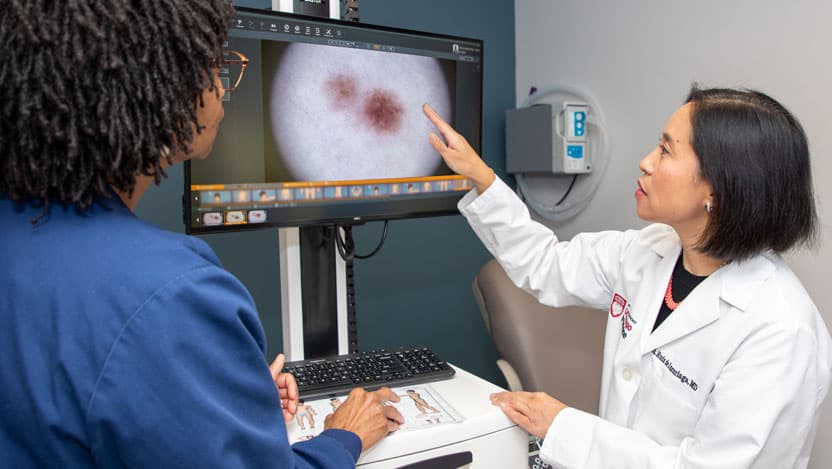Melanoma

For example, UChicago Medicine was among the first hospitals in the nation to offer tumor-infiltrating lymphocyte therapy (TIL therapy) for advanced melanoma. This innovative treatment is a type of immunotherapy that increases the body’s ability to fight cancer when other treatments have failed.
Expertise in Advanced and Rare Melanomas
If you have advanced (metastatic) melanoma or a rare type of tumor and have been told by other cancer centers that your options are limited, we are here to offer hope. Our team routinely offers second opinions to patients with advanced and complex cases of melanoma. We can also provide the latest treatments through clinical trials when standard treatments have failed to keep melanoma from spreading or recurring (returning).Our team is also highly experienced in diagnosing and treating melanomas that affect people of color. We prioritize early detection of melanoma in all patients, regardless of skin color.
If you are at risk for melanoma because of a weakened immune system, organ transplant or medications, we’ll work closely with your other specialists on a personalized plan to screen for, diagnose and treat your skin cancer.
Our specialists also have extensive knowledge in uveal melanoma, a rare and difficult-to-treat melanoma that forms in the back of the eye. Clinical research at UChicago Medicine helped pave the way for an innovative new treatment for uveal melanoma.
Why Should I Choose UChicago Medicine for Melanoma Care?
Our international recognition: UChicago Medicine is among the world’s leading cancer centers and is designated a Comprehensive Cancer Center by the National Cancer Institute (NCI). Only two cancer centers in Illinois have earned that distinction for comprehensive research, care, education and community outreach programs. This means that if you have melanoma, you can be sure that your care plan includes the most innovative treatments available to help you live the longest, fullest life possible.
Our focus on monitoring high-risk patients: If you have suspicious moles, our medical dermatologists will examine you and perform biopsies on any concerning lesions. Our dermatologists also offer a specialized mole mapping clinic where our faculty will closely monitor your skin lesions with high-resolution full-body digital photography while sparing you unnecessary and uncomfortable biopsies. Our dermatologists welcome patients who want peace of mind by knowing that skilled experts are monitoring their skin for any changes.
Our expertise in diagnosing melanoma: Melanoma isn’t always easy to diagnose, and a misdiagnosis could be a missed opportunity for lifesaving treatment. Our dermatology and dermatopathology faculty include some of the most experienced doctors and international experts at diagnosing difficult pigmented lesions and melanoma at its earliest stages when it is most treatable.
Our scope of melanoma treatments: UChicago Medicine offers all FDA-approved treatments for early and advanced melanoma, so our patients can benefit from the latest surgical, systemic and regional therapies as well as clinical trials — many of which are not available at most hospitals. Our dermatopathologists can also perform molecular tests to determine if you are a candidate for advanced treatments like targeted therapies that attack your tumor’s specific genes.
Our experience with advanced melanoma: The Limited Metastatic Cancer Program (L-MEC) at UChicago Medicine is internationally known for its innovative approach to controlling — and sometimes eliminating — melanoma and other cancers that have spread to a few sites in the body. Our team also specializes in preventing and treating recurrent melanoma using a combination of innovative approaches that are not available at most hospitals. Our team also has internationally recognized research expertise in immunology and cancer, which has led to significant advances in melanoma treatment worldwide.
Our team-based approach to care: Everyone on the melanoma care team at UChicago Medicine — including our pathologists, dermatologists, surgeons and oncologists — specializes in diagnosing and managing melanoma at every stage. If you have risk factors for skin cancer, or if your treatment has failed or your cancer has returned, we will work together to find solutions for you.
Learn More About Melanoma
Melanoma typically occurs when the cells that make pigment in the skin become cancerous. Because melanoma can spread through lymph nodes and to the internal organs, it is the deadliest of skin cancers. However, if melanoma is diagnosed and treated early, it can usually be cured.
Less often, melanoma can start in parts of the eye, such as the middle layer of the wall of the eye (uveal melanoma), or in the mucous membranes inside the body (mucosal melanoma).
You may have a higher risk for melanoma if you have:
- A history of moles that have an irregular shape or uneven color (called dysplastic nevi)
- More than 50 moles
- A personal or family history of melanoma or other skin cancer
- A history of severe or blistering sunburns
- Fair skin and light eyes
- A weakened immune system
If you are at risk, our team can monitor your skin to catch any early signs of melanoma. Skin cancer screening by our dermatologists and mole mapping when needed can detect melanoma early on, when it is most treatable.
Common signs of melanoma include:
- A growing mole that changes shape, color or size
- A mole that bleeds or is painful
- A new “mole” that grows rapidly
- A growing dark streak or discoloration of the nail, or black/dark brown discoloration of the palms/soles or eye
If you notice any changes in your skin, make an appointment to see a dermatologist.
To reduce your risk of melanoma and other types of skin cancer:
- Wear a broad-spectrum sunscreen that protects against ultraviolet A (UVA) and ultraviolet B (UVB) rays. The sunscreen should have a sun protection factor (SPF) of at least 30 or higher. Reapply it at least every two hours or more frequently if you are swimming or sweating.
- Wear a lip balm with an SPF 15 or more.
- Wear sunglasses, wide-brimmed hats and sun-protective swimwear and other clothing with an ultraviolet protection factor (UPF) rating.
- Seek shade when outdoors, especially between 10 a.m. and 2 p.m.
- Avoid tanning beds.
- Perform regular self-exams of skin lesions.

Cancer Care Second Opinions
Request a second opinion from UChicago Medicine experts in cancer care.

Participate in a Clinical Trial
UChicago Medicine melanoma cancer experts are actively conducting clinical trials of new and promising treatments.

Harnessing the Immune System to Fight Cancer
Immunotherapy — a treatment that mobilizes the body's own defense system to fight diseases — is revolutionizing the way we treat cancer.
